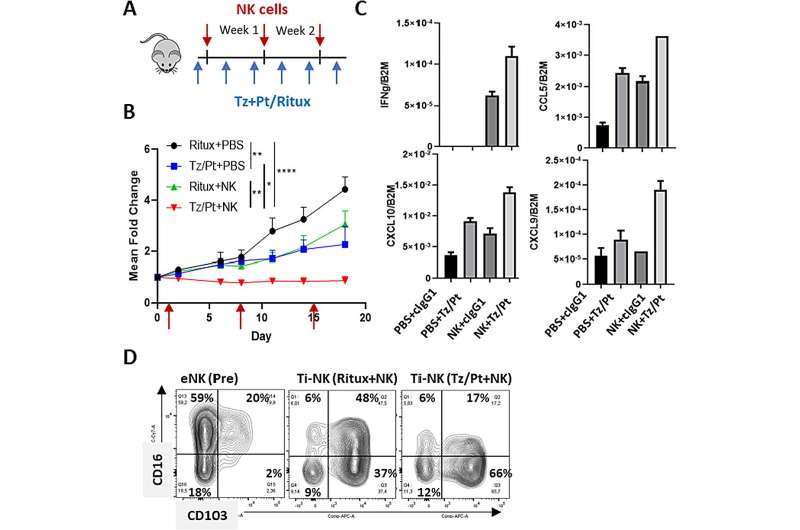
Researchers at the UAB and the Hospital del Mar Research Institute have confirmed that patients with the presence of NK lymphocytes around tumors have a better response to treatment. This confirms the feasibility of using cytokines secreted by NK cells as markers of response to treatment with a simple blood test and supports the use of these lymphocytes to reinforce treatment in patients with metastatic HER2-positive breast cancer.
A specific type of lymphocyte, the natural killers (NKs), known for their anti-tumoral properties, are also capable, in combination with a treatment against the most aggressive form of breast càncer, to alert the immune system of the presence of cancer cells. A capacity that allows them to recruit other immune system cells to join and fight against the tumor.
This is certified by a study published in the Journal of Experimental & Clinical Cancer Research, which has also allowed researchers to describe a potential biomarker to identify patients having a positive response to the treatment.
The study was led by researchers from the Immunity and Infection Research Group of the Hospital del Mar Research Institute, Dr. Aura Muntasell, who also lectures at the Universitat Autònoma de Barcelona, and Ph.D. student Sara Santana.
A tumor alert
Previous studies by the same group had confirmed the fact that the presence of natural killer cells, a type of cytotoxic lymphocyte that can kill tumor cells, in the setting of HER2-positive breast cancer tumors, was related to the patients’ response to treatment with anti-HER2 anticoagulants. However, despite this association, their number was lower than that of other cells of the immune system, and therefore researchers suspected that they also had a regulatory role in the response of the body’s defenses against cancer.
This new study focused on clarifying this aspect. From the comparison of the RNA set of biopsies of HER2-positive breast cancer tumors with and without the presence of NK cells, and of models with mice, the work has been able to demonstrate that these cells, when in contact with the antibodies used against these tumors, secrete two types of small proteins, cytokines, and other soluble factors.
This modifies the tumor’s microenvironment, which in turn facilitates the arrival of other cells of the immune system, reinforcing the action of the treatment against cancer.
“Part of the effect of anti-HER2 antibodies is not only due to their intrinsic effect on tumor cells, but also to the fact that these antibodies allow, through NK cells, to trigger an antitumor immune response,” explains Dr. Muntasell.
These conclusions were confirmed with the analysis of eighty samples. It was found that, in those with higher levels of natural killer cells, there was also a greater presence of lymphocytes with antitumor properties. In other words, they have the ability to alert the immune system and recruit other cells to target and eliminate cancer cells.
Dr. Muntasell explains the mechanism involved in this process, pointing out that “the fact that there are NK cells in the presence of the anti-HER2 antibodies leads to an antitumor immune response.”
Therefore, NK lymphocytes not only have a direct antitumor function because they can kill transformed cells, but they also trigger this alarm that allows other cells of the immune system to reach the tumor and help eliminate it. In other words, they show the immune system where the tumor is so that it can fight it.
Potential new biomarker of treatment response
The study also analyzed the possibility of detecting in patients, with a blood or serum test, the factors segregating natural killer cells when coming into contact with the treatment using anti-HER2 antibodies. Through serum samples of patients in treatment, their presence was confirmed in cases in which the person had had a positive response.
“This new evidence supports the capacity of anti-HER2 therapy to bring on an immune response which is relevantly correlated with a greater therapeutic efficacy. This must serve to continue advancing in the improvement and personalization of the treatment for patients with HER2 positive breast cancer,” says Dr. Joan Albanell, head of the Hospital del Mar Cancer Unit, director of the Cancer Research program of the Hospital del Mar Research Institute, and one of the authors of the study.
These discoveries validate the therapeutic strategies being developed at this moment, such as a clinical trial currently being conducted and led by the Vall d’Hebron Institute of Oncology (VHIO), with the involvement of Hospital del Mar, to transfer lymphocytes from a healthy donor into patients with HER2 positive metastatic breast cancer in combination with anti-HER2 antibodies, and in which the Clínica Universidad de Navarra and the Hospital Puerta de Hierro of Madrid also participate.
The researchers consider that these conclusions can be transferred to other types of tumors, since the study “proves that the NK lymphocyte activity as a cell capable of modifying the tumor’s environment is translatable to other tumors,” explains Dr. Muntasell.
More information:
Sara Santana-Hernández et al, NK cell-triggered CCL5/IFNγ-CXCL9/10 axis underlies the clinical efficacy of neoadjuvant anti-HER2 antibodies in breast cancer, Journal of Experimental & Clinical Cancer Research (2024). DOI: 10.1186/s13046-023-02918-4
Citation:
Lymphocytes recruit the immune system to fight most aggressive breast cancer, study confirms (2024, May 3)
retrieved 4 May 2024
from https://medicalxpress.com/news/2024-05-lymphocytes-immune-aggressive-breast-cancer.html
This document is subject to copyright. Apart from any fair dealing for the purpose of private study or research, no
part may be reproduced without the written permission. The content is provided for information purposes only.

